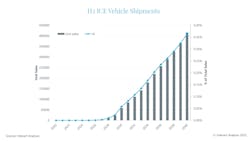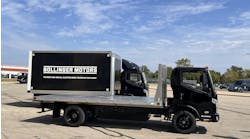Estimate: 400,000 hydrogen internal combustion engines in use by 2040
New research from Interact Analysis predicts that the use of hydrogen-powered internal combustion engines (ICE) will take off within the next five years, and grow exponentially over the next 17.
“The number of registered H2 ICE vehicles is forecast to grow to 58,000 in 2030,” said Jamie Fox, principal analyst at Interact Analysis. “Covering all on road and off-road vehicles (including trains, agricultural equipment, trucks and passenger cars), this figure is set to see significant growth post 2030, with uptake of H2 ICE technology projected to soar to more than 400,000 shipments by 2040.”
But for this to future to come to pass, hydrogen ICE vehicles face several hurdles that decrease their viability both in the present and the short-term future. Chief among these is cost. While the expense to produce hydrogen engines and the vehicles themselves is relatively low, and comparable to diesel engines, the operating cost is likely to become a limiting factor.
“Due to unfavorable TCO and high fuel costs H2 ICE vehicles are unlikely to become the market leader,” Fox admitted. “Despite the many environmental benefits to the use of hydrogen vehicles, for mass adoption to occur the refueling infrastructure required must be developed and customer payback improved. We are still seeing many limitations to refueling infrastructure for battery electric vehicles so it is unlikely that we will see a significant amount of change in the H2 infrastructure for many years.”
See also: Plug Power previews the potential of a green hydrogen highway
See also: Westport and Johnson Matthey team up on hydrogen emissions aftertreatment
Currently, the average cost of fuel per mile for H2 vehicles is higher than for battery-electric vehicles fuel cell electric vehicles, making H2 ICE technology best suited for applications with low mileage/hours per day. Interact Analysis noted that "off-road vehicles are perhaps best suited to this technology since battery electric and fuel cell alternatives face greater infrastructure challenges in off-road environments"
Hydrogen ICE engines will also require minor changes such as materials and components used, such as different spark plugs, and will overall be more complex and include more risks on the production side. Fueling infrastructure will also be another hurdle to overcome, the firm added.
However, it is worth noting that many of these issues may be resolved or ameliorated with the continued technological development surrounding hydrogen vehicles. Interact Analysis predicts that the cost of hydrogen will reduce significantly over time and, if it continues to fall at pace, hydrogen ICE vehicles could become more competitive across a wider range of applications in the future.
Engine manufacturer Cummins is currently developing options to make H2 ICE viable in the future:




